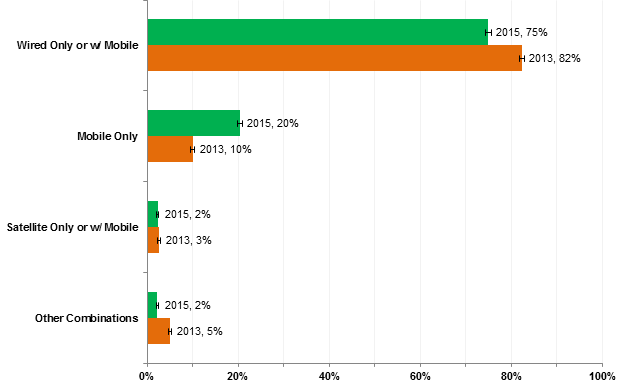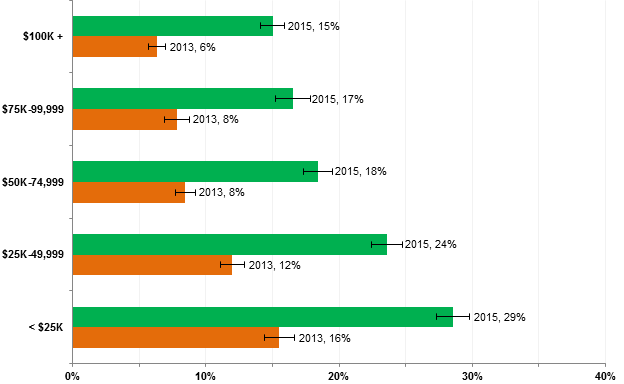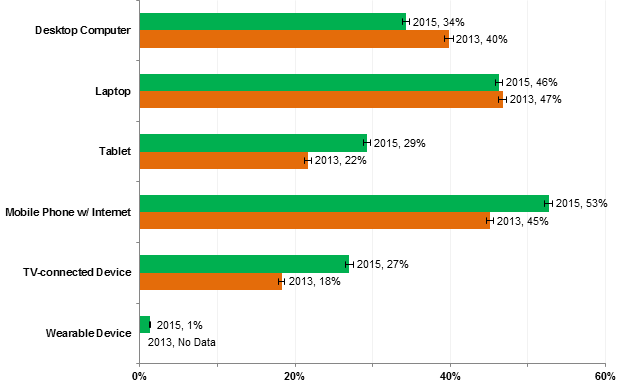Affiliate links on Android Authority may earn us a commission. Learn more.
Study: American households increasingly rely on mobile-only Internet

Mobile devices have fundamentally changed the way in which people interact with the world, and data now suggests it’s also changing the way people access it, as well. The US Department of Commerce’s National Telecommunications and Information Administration (NITA) has published a new study that found more and more Americans opting for mobile Internet access instead of home broadband. The results, collected by the US Census Bureau, comprise almost 53,000 households surveyed in July 2015 and compared it to past years.
The data indicated that the use of broadband Internet services at home – i.e. DSL, cable, or fiber – has dropped from 82% to 75% between July 2013 and July 2015. This represents a 7% decrease. At the same time, the exclusive use of mobile Internet service use at home has doubled from 10% to 20% in the same period.

The study also looked at the preferred method of accessing the Internet as broken down by income levels. It found that those households with lower incomes were more likely to use mobile data at home than those in higher income brackets. For families with income below $25,000 per year, their use of mobile devices went from 16% in 2013 to 29% in 2015, an increase of 13%.

While all income brackets showed an significant increase, the total usage percentage itself is progressively lower as income level rises. The Washington Post points out that lower income families often have to use free Wi-Fi spots or public libraries to access the Internet. It would logically follow that having a mobile data plan would serve to alleviate the inconvenience.
The Washington Post also draws a conclusion from the data,
Stepping back a bit, as many as 1 in 5 U.S. households are now mobile-only, compared with 1 in 10 in 2013. That’s a doubling in just two years. This suggests that having only one form of Internet access instead of two may no longer be explained simply as the result of financial hardship — as might be the case for lower-income Americans — but could be the product of a conscious choice, at least for wealthier people, who are deciding that having both is unnecessary.
Indeed the final graph posted by NITA adds to the above conclusion. With respect to the device used to access the Internet at home, mobile phones now represent over 50% – a majority – as desktop computers have fallen. Interestingly enough, laptops have seen almost no decline, whereas tablets and TV-connected Devices have seen an increase. Also, for the first time ever, wearables now chart:

Wrap Up
Without a doubt, there is a growing trend among American households that indicate Internet access has increasingly become more prevalent from mobile devices. As more and more citizens get smartphones – especially devices with faster data provided by LTE – their habits have started to change. In particular, the point raised by The Washington Post seems of particular relevance: customers may simply be opting for one main form of Internet instead of two, especially as more of their Internet-related habits can be accomplished simply by the smartphone.
Now seems as good a time as ever for broadband service providers to begin simplifying things and providing more transparency, something the US Government itself wants to facilitate.
What about you, the reader? Does your home Internet use correspond to the trends suggested by the survey data in this piece? Do you use mobile exclusively? Leave your thoughts below!